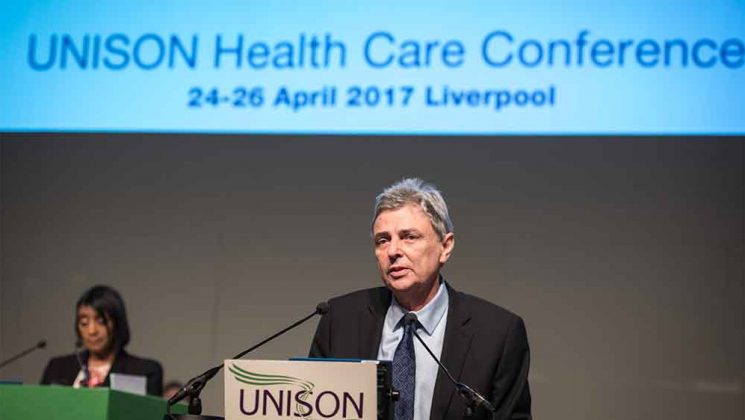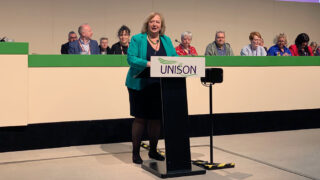The future of an NHS that is “on the brink” must be centre stage during the general election campaign, UNISON health conference delegates in Liverpool were told today.
In his keynote address, union general secretary Dave Prentis said: “We have six weeks to save the NHS.
“We all know what happens if the Tories get back. Everything that matters to our members is on the line – your jobs, your wages, our public services, our NHS, our communities and our families.
“A general election is always a moment when we decide the future of our country.
“But perhaps never more so than this time. The government wants a renewed mandate to make all of us worse off, easier to fire or even put out of work.
“That cannot happen and must not be allowed to happen. We will fight and fight and fight to make sure this government is defeated.”
Mr Prentis took the first session of the conference to celebrate the news, following Unite’s recent release of its membership figures, that UNISON is now the UK’s largest trade union.
And he said much of that was down to its continuing recruitment – not least in the health service.
But he then spoke of the damage that had been done to public services by seven years of Tory government and of its many false promises, such as to properly fund the health service.
“You cannot trust the Tories with the National Health Service – especially over pay,” he said, describing the latest 1% pay award as “an insult”.
The general secretary said that the union would be formulating its own health service manifesto and would be seeking all parties contesting the election to make a commitment to it.
Roz Norman, the chair of the health service group executive, told delegates that the last year had been “another tumultuous one, with no sign of a let-up.”
After seven years of elections, referendums and leadership contests, mayoral and local elections, she admitted that “it would be easy to become apathetic, easy to turn your backs on the endless politicking.

“But we cannot do that. UNISON cannot give up the fight. Because we have responsibilities: a responsibility to stand up for our members; a responsibility to fight for the future of our NHS; and a responsibility to vehemently oppose Theresa May and her politics of division.”
The impending exit from the EU would also be a major election issue, she said, with major consequences for UNISON and the health service.
“The government’s failure to guarantee the right to remain for EU colleagues, who work tirelessly, day in and day out, to keep our NHS afloat, is nothing less than a disgrace.”
But she added that the election could not be solely about the EU exit.
“We have to ensure that the health service is centre stage at all times. Not because it suits any particular party. Not because we want to play politics with our NHS. But because our NHS is teetering on the brink.
“It has been ravaged by Tory underfunding – directly in England and via cuts to the Barnett Formula in the devolved nations.
“The NHS is going through its biggest financial squeeze ever. Far from being protected, real terms spending per head is actually set to fall in the next financial year.”
As well as the “derisory” pay offer, the results of that underfunding included:
- 24,000 unfilled nursing vacancies;
- 3,500 too few midwives;
- the sidelining of admin and ancillary staff;
- the ending of the NHS bursary for nurses, midwives and allied health professions;
- the “terrible toll” of staff working at the sharp end, such as paramedics, whose 180,000 days of sickness absence in the last four years have been attributed to stress, anxiety and other mental health problems.
UNISON is currently consulting branches on the pay offer, testing the appetite for industrial action. And Ms Norman urged them to respond by the 2 May deadline.
Whatever the outcome of that consultation, she said that the union had to keep its momentum, with continued pressure on the government to untie the hands of the Pay Review Body, and the pursuit of local action on issues that affect take home pay.
She also highlighted UNISON’s many successes in the past year, including the ambulance sector gaining band 6 for paramedics, the band 1 changes in Scotland that are helping to tackle low pay and, in Wales, a statutory requirement for safe staffing.
“Our conference this year takes its title from our successful One Team for Patient Care campaign,” she said. “While many around us remain divided, our strength derives from this sense of unity – and we must strive to keep it this way.”
She pledged the support of the service group executive to members in Northern Ireland in their struggle to win a meaningful pay award. And Mr Prentis gave the union’s full support to any health branches seeking to protect the terms and conditions of their members.
Both Mr Prentis and Ms Norman praised late president Eric Roberts.
“Liverpool and the health service were close to the heart of someone who we lost last year,” Mr Prentis said.
“I can’t tell you how much he would have wanted to be here today, representing this union with you all. Standing up for health workers, and ambulance workers in particular, was his life’s work.”
The general secretary added a word for the health delegates and the colleagues they represent.
“You are the beating heart of our health service and of our communities. Every one of you has a vital role to play. And there are no dispensable people in our health service. Only the indispensable – the public service champions.”





